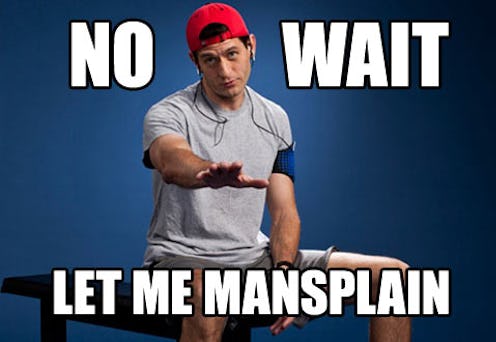Life
Hey Dudes, Quit Explaining Misogyny To Me

This past week has been a very interesting social experiment for feminists. In the aftermath of Elliot Rodger’s deadly Isla Vista shooting spree, the word “misogyny” made more headlines in just a few days than it had in the few preceding years. Charges from feminists that Rodger was motivated by misogyny were received with a variety of criticisms, many of those coming from straight, white, cisgender, heterosexual men.
As someone who has posted articles about Elliot Rodger on Facebook and Twitter, I have heard countless opinions from men that have ranged from thoughtful discussion to outright vitriol. Facebook is always sort of a battlefield for political opinions, especially from people who love to play “devil’s advocate,” or just argue with their friends for the shits and giggles.
In the case of Rodger, I have been told on more than one occasion by men that this shooting spree was about mental illness, gun violence, oversexualization — practically every other societal ill except misogyny. When I, or any of the dozens of women who have discussed this issue with men on social media, attempt to explain why Rodger’s sexist manifesto and obsession with men’s rights do make this tragedy at least partially about misogyny, we’re almost always shot down. Even worse, we’re told that we don’t understand what misogyny is because there are so many “bigger” problems that affect women that we should be trying to fix.
On Wednesday, post by Melissa McEwan at Shakesville about a horrible attempted rape scene in an episode of the FX show Louie, drew ire from random dudes on my Facebook page. Because I didn’t think that the “joke” about Louis CK's character trying to rape someone was very funny, it must have been that I was too stupid to understand the joke, and that I just choose to get outraged about silly things to “further my cause.”
I am outraged, but it sure as hell isn't silly. What the men who try to explain misogyny to women clearly do not understand is that misogyny is not limited to domestic violence and pay inequality. It isn’t something that only exists when women are raped and beaten by men for refusing sexual advances. Misogyny is a much more pervasive problem in our culture, something that we see on television, experience on the street, and hear spewing from the mouths of politicians who want to control our bodies every single day.
When women say that something is misogynist, whether it’s a comedian’s joke or a violent killing spree, it isn’t up to these men to come and tell us that we’re wrong. Women know exactly what misogyny is because we experience misogyny, not because we read about it in a book or on a feminist blog. This “faux-outrage” that anti-feminists and progressive men alike complain about is rooted in a deep-seated fear that something exactly like this could happen to us.
When we see misogyny in the media, women are reminded of the times that we have been sexually harassed in bars or while walking down the street. When we hear judges tell rape victims that they shouldn’t have been drunk or dressed so provocatively, some of us recall very similar experiences. Even seemingly minor instances of misogyny, like a rape joke on a television show, can dredge up anxiety about horrific trauma.
Stop telling me about what misogyny is or isn’t. You can read about misogyny in books and be the best feminist ally you can possibly be, but there is no way that you can fully understand the way that misogyny profoundly impacts the women in your lives. This is not to suggest that men aren’t allowed to have opinions about feminism and issues that impact women, but it should provide some insight into why women are exhausted with having men explain misogyny to us. Misogyny is not theoretical for us — it is our lives.
Shouting down women is a silencing tactic that has existed probably since the beginning of time. This often results in women who just don’t speak out about misogyny because they’re not interested in “debating” with men who don’t have the same personal stake in the issue and issues like it. Men can be amazing feminist allies, but that doesn’t mean that they should speak over women when they lack personal experience.
Instead of presuming to tell us that we are “overreacting” and “not focusing on the true problems,” why don’t these men put down the keyboard and start doing something to improve the attitudes that create a society where misogyny is not acceptable but expected? Start with your own, please.